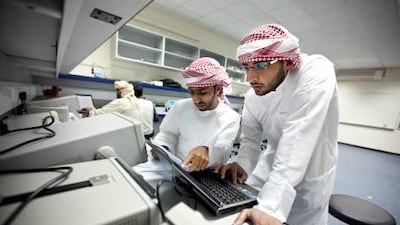Workers over 30 in remote Al Gharbia who want to go back to school are facing a number of hurdles.
"The job market is so focused on school leavers and graduates, but there are a lot of older guys like me who want to improve themselves and just keep facing obstacles," says Abdallah bin Taresh, who is pursuing a degree in his free time.
The root of the problem is that while all Emirati school leavers get free education at one of the three federal universities, that policy expires once they turn 30.
Further, companies say they are stuck with strict, long-standing rules that limit study leave; and the federal universities are strapped for space and cash, and struggle to cope even with the numbers they already have.
It is, says Dr Phil Quirke, head of the Higher Colleges of Technology (HCT) campuses in Al Gharbia, a problem that education and industry must tackle together.
For industry, read Adnoc - the Abu Dhabi National Oil Company, which is the biggest employer in the region. It remains tied to rules written in the 1970s that, according to Dr Quirke, make it tough to work and study at the same time.
Those rules do not allow for part-time work, so staff wanting to study must do so in their own time, in evenings or weekends. The company does allow its employees to take four years' sabbatical leave, but few can afford to do so.
Ahmed Al Romaithi, head of Emiratisation and training at Adnoc, said the process of changing the internal rules about part-time work and study leave is complicated, with so many companies under the Adnoc umbrella.
"A lot of employees want to go and study something that is not related to their work," he said.
"Of course it's a good thing if people want to improve themselves and Adnoc supports this with workshops and training, but when we go to change legislation, we have to consider all the groups within the company."
Even if the rules were simpler, HCT's two Al Gharbia campuses, in Madinat Zayed and Ruwais, would struggle to cope with a large influx of students.
HCT is currently the only higher education provider in the region, although more are planned for the coming years, including branches of the federal Zayed University and the private Abu Dhabi University.
Mr bin Taresh, 39, has been with Adnoc for 11 years. He is now in the second year of a degree in mechatronics, an area of engineering that includes electrical and mechanical engineering. Getting there, he says, has meant overcoming obstacles at every stage.
"When I joined Adnoc, I was told I had to wait two years," he said. "Then after that, they told me because I'm over 30, I don't qualify. I wanted to be a better employee and a better person, but I just kept finding hurdles."
Better for the company, he said, to invest in its existing staff, and to hire locally rather than bringing in staff from Abu Dhabi and Dubai.
Mr bin Taresh, who left school for a career in the army - he served for eight years before retiring with an injury - struggles to balance his full-time job with his studies, using his annual leave for studying and examination preparation.
Younes Proctor, head of learning and development at Etihad Rail, which is looking to hire some 2,500 people for its planned railway project in the Western Region, said it is vital not to let people's preconceptions exclude older workers from a chance of education.
"People are a work in progress, all through their careers," he said. "Barriers such as age and gender can lead to very rash judgements about people and can have the effect of blocking people's development."
For Emiratisation to succeed, especially in such areas as Al Gharbia, it has to be based on the continuous development of those already in the workplace. "It's all about on-the-job learning," he said.
And that, says Dr Quirke, means companies need to do more. "Industry and commerce continually step back from this responsibility yet the government is providing education to feed industry and commerce."
@ For more on UNIVERSITIES, visit thenational.ae/topics

